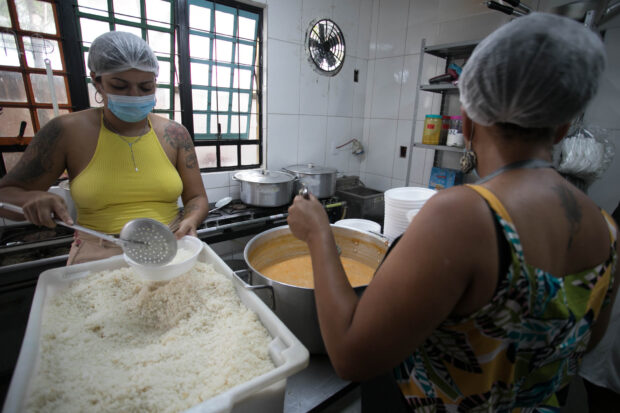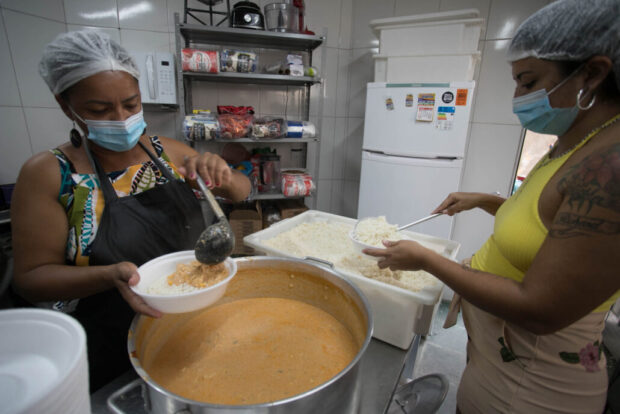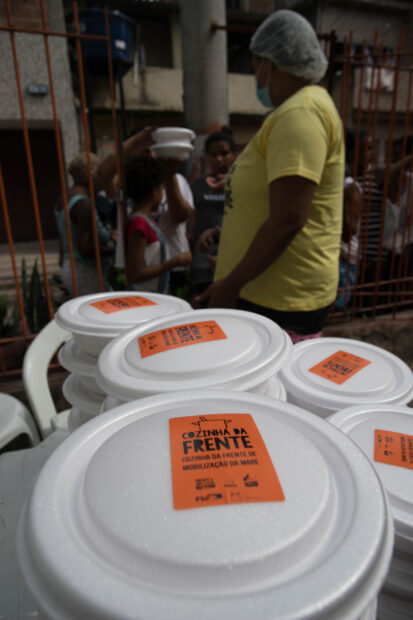
The Covid-19 pandemic has impacted people’s lives around the globe, resulting in huge changes in habits and routines, not to mention generating high unemployment rates. According to the Brazilian Institute of Geography and Statistics (IBGE), in the first quarter of 2021 the number of unemployed in the country exceeded 15.2 million—a rate of 14.9%. Even though Brazil is now regaining jobs, many are informal and without a signed contract. Brazil has also returned to the UN Hunger Map which features nations where over 2.5% of the population faces chronic food shortages.

Approximately 33.1 million Brazilians currently experience severe food insecurity. Some areas—where there is an absence of public investment—feel this inequality more deeply. In order to mitigate these impacts in Maré—a grouping of favelas located in the North Zone of Rio de Janeiro—the Maré Mobilization Front was created. Better known as the Maré Front, the group was established in early 2020 with a focus on Covid-19 communication in their communities. However, it was forced to expand its work to provide emergency aid to families in Maré by distributing food, hygiene products, cooking gas cylinders and other items to people in the most vulnerable situations.
In 2021, donations of basic foodstuffs and hygiene products decreased significantly. Partly as a result of the relaxation of Covid-19 restrictions, the Maré Front chose to work in a new way, launching the Front Kitchen to distribute cooked meals to Maré residents.

When the kitchen is in operation, an average of 150 to 200 hot meals is served to residents. Vanusa Borba, coordinator of the Front Kitchen, explained where supplies used to produce the meals distributed by the initiative come from: “The supplies for the production of meals are donations from other initiatives or from when we solicit donations from individuals and companies.”
With regard to the dishes that are served on distribution days, Borba says that the dishes served depend on the donations received: “Each dish is decided according to the donations we’ve received. If we have pasta and sausage, that will be the dish. If we have rice and beans, we can make a chicken stew with vegetables and a farofa [cooked cassava flour]. Everything really depends on what we receive in donations.”
When asked about the importance of the work done by the Front Kitchen, Borba says that this should really be a state policy: “We are aware that our work does not end hunger, that the work we do should be done by the State. However, if we don’t do it ourselves, if we don’t chase after donations, mapping the families that need it most and helping them in some way, people will be in need. It was like this during the most critical period of the pandemic.”

Like Borba, Débora Silva—a resident of Maré served by the Front Kitchen—emphasizes the importance of the work the project does. “Some people don’t even have rice or beans to eat. Some people don’t even have gas to cook with. The distribution of hot meals means it is easier for them to eat… Through the food parcels I started to help in the kitchen. I really like it, it’s very rewarding helping the people around me.”
According to reports from volunteers and those served by the Front Kitchen, the State does not carry out any type of food distribution program in Maré or other favelas in Rio. In Borba’s opinion, this does not happen because the current federal government believes that they already distribute enough emergency aid. She said, “I believe the government thinks that the emergency aid that some families are receiving is more than enough. However, considering the composition of families who reside in Maré, this amount is insufficient to cover a month’s consumption for one person, let alone a family.”
We can see that there’s been an increase in the number of people experiencing homelessness in Rio. Sometimes entire families share a tent because they have nowhere to live. We see more and more people scavenging for food in garbage bins, children begging for money on public transport and mothers who agree to any kind of work in order to provide for their families. All of these things reflect the deep inequality in our society. The State should take a careful look at people who are in a situation of food insecurity—among other social problems.
Juliana Pinho is a resident of Nova Holanda, one of the favelas that make up Complexo da Maré, and has a degree in both Social Sciences (UFRJ) and Journalism (UCAM). A popular communicator and community organizer, Pinho co-founded the Maré Mobilization Front, is a member of the Palafitas Agency, and is responsible for management and planning of the For Her project. Currently, she manages NGO Fight For Peace‘s portfolio.
